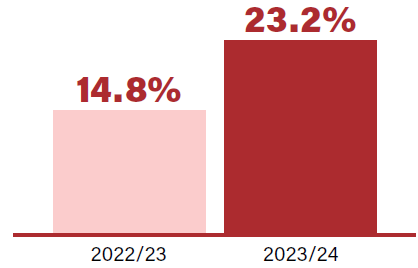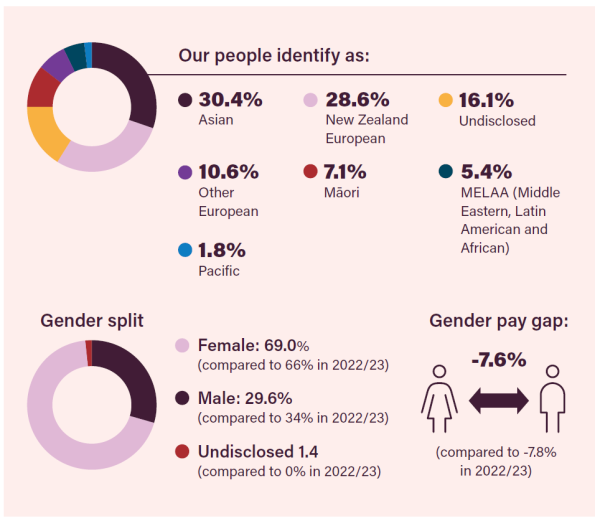On this page
Driven by purpose – the why behind our Ministry
Our journey as a Ministry began in response to the recommendations of the Royal Commission of Inquiry following the terrorist attack on Christchurch mosques in March 2019.
Since our inception on 1 July 2021, we have embraced our role as the Government’s lead for supporting Ethnic Communities and working to maximise the benefits of diversity and inclusion for all people in New Zealand.
We are continuously reviewing our plans and work programmes to ensure that they remain responsive to the evolving needs of Ethnic Communities and are still valid in the constantly changing national and local contexts.
Our values
At the Ministry, we lead by example, living the values we champion among the Ethnic Communities we serve. These values are the guiding principles of our work, helping us create a truly inclusive Aotearoa.
We are dedicated to honouring tāngata whenua by integrating a te ao Māori perspective throughout our mahi.
We encourage all our employees to embody our core values: show Manaakitanga (kindness), practice Whakakotahitanga (inclusivity), display Whakamanawanui (courage), and be Ngākau pono (authentic).

Our people
We are a relatively small agency. Our Ministry has a total headcount of 71 individual employees as at 30 June 2024. As some employees work part-time, our total full-time equivalent (FTE) staff number is 69.2.
Our staff numbers fluctuate from one year to another due to the number of graduates on our Ethnic Communities Graduate Programme.
![Infographic: Our staff (including graduates). Total headcount [Bold] 71 [normal] Comprised of: Fixed-term (including graduates): 30 Permanent 41. Total FTE: 69.2 Comprised of: Fixed term: 30 Permanent 39.2 Occupation: Chief Executive's office 1, Policy and Analytics 25, Strategic Engagement and Partnerships: 13, System Capability and Programmes: 16 Graduates 16. Graduates here refer to staff employed through our Ethnic Graduate Programmed hosted by other organisations.](/assets/Resources/AR-Whoweare-OurStaff__ResizedImageWzYwMCw1MzNd.png)
Unplanned staff turnover
The Ministry’s unplanned turnover (permanent staff lost due to reasons not planned for such as resignations) as at 30 June 2024 was 23.2 percent (compared to 14.8 percent in 2022/23). This figure includes a number of exits as a result of the Ministry’s change process.

Papa Pounamu, Kia Toipoto and Whāinga Amorangi
Papa Pounamu is a government-wide, diversity, equity and inclusion programme, led by the chief executives. It has five priority areas: fostering diverse leadership, building inclusive leadership, building cultural competence, addressing bias, and supporting employee-led networks.
Papa Pounamu is part of other separate, but related, work programmes to strengthen public sector capability for Māori-Crown relationships (Whāinga Amorangi) and close public service pay gaps (Kia Toipoto).
The Ministry’s role in supporting diversity, equity and inclusion initiatives in the public service is both internal and external:
- Internally, we ensure that we have initiatives in place to deliver our obligations under Papa Pounamu, Kia Toipoto and Whāinga Amorangi, and build positive and safe workplaces for our staff (kaimahi)
- Externally, given one of the foundational pou is specific to Ethnic Communities, we ensure that the diversity, equity and inclusion work across government includes Ethnic Communities. We also provide advice, tools and resources to help the public sector with intercultural capability and language.
Kia Toipoto: Our progress towards a more inclusive workplace
We have made progress in achieving the milestones outlined in our Kia Toipoto action plan.
We constantly monitor our recruitment and remuneration processes to balance our gender pay gap as much as possible.
To monitor this, we produce regular reports on staff demographics, salaries and pay gaps. This data plays a crucial role in guiding our Human Resources decisions.
Whāinga Amorangi: Increasing our Māori-Crown capability
We continued meeting our Whāinga Amorangi obligations and building our ability to engage and partner with Māori more effectively.
Te Arawhiti endorsed our Whāinga Amorangi plan on 30 June 2023, which includes commitments to:
- Te reo Māori
- New Zealand history/Treaty of Waitangi literacy
- Tikanga/kawa (customs/marae protocol).
This year, we have provided our people with learning opportunities to help them increase their capability in te reo, tikanga and kawa, te ao Māori concepts, New Zealand history, the Treaty of Waitangi/Te Tiriti o Waitangi, whakawhanaungatanga and racial equity.
Our diverse team
Our diverse mix of ethnicities reflects our role and the communities we support.
Our people may identify with multiple ethnicities and the figures below reflect their primary identity (excluding graduates).

In our Ministry, we are committed to gender equality. Currently, female employees have higher average pay than male employees. This is influenced by our size, the higher proportion of females compared to males, and having more females in higher paying roles.
Working in a constrained fiscal environment
The second half of the year has seen a tighter fiscal environment. This was reinforced by the new Government’s directive to the Ministry to achieve a 6.5 percent baseline saving, which necessitated change. We embarked on a review of our delivery approach and an organisational change process, resulting in a reduction in our overall headcount by 30 June 2024.
